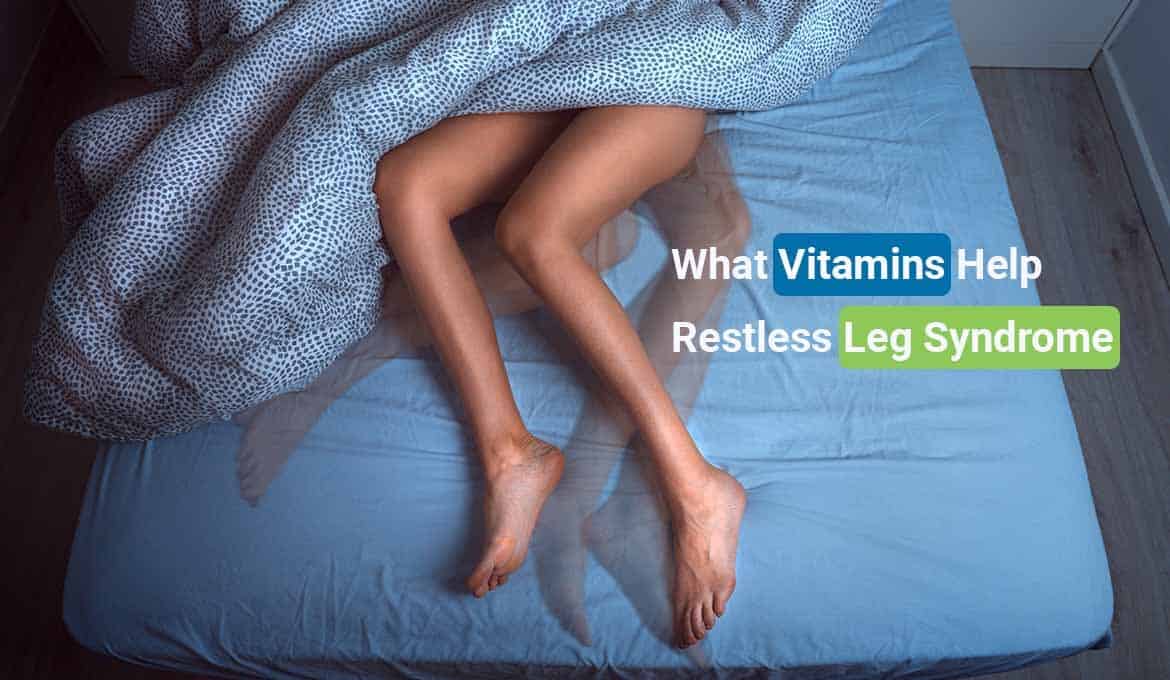
How often have you tried to relax but found it challenging because of a constant tingling in your leg?
Not to mention, this tingling would not subside until you constantly move the affected part of your leg. After a point, you may start to follow this habit unconsciously. It expands beyond your private space, and you find yourself constantly catering to this sensation.
These uncomfortable sensations, often in the form of tingling, crawling, or creeping feelings, are what we term restless leg syndrome. This condition is also referred to as periodic limb movement disorder (PLMD) and is synonymous with a magnetic urge to move your legs to gain temporary relief.
Most cases of restless leg syndrome occur during the evening or the night. Hence, most would deem them harmless. But restless leg syndrome indicates an internal problem in your body that might spill over to other aspects of your life.
Curious to know more? Read on as we discuss the causes and consequences and understand what vitamins are ideal to combat restless leg syndrome.
What are the Causes of Restless Leg Syndrome?
While several studies have been commissioned to pinpoint the exact reason for restless leg syndrome, no promising results have been obtained.
The most widely accepted fact states that discrepancies in dopamine levels cause this condition. Since dopamine is responsible for enabling muscle movement, a widespread belief is that abnormal levels of this hormone cause a sharp sensation in the feet.
Some other hypothesized causes are as follows:
- Undiagnosed health conditions: Conditions like anemia, chronic kidney disease, diabetes, and rheumatoid arthritis may cause restless leg syndrome and other symptoms.
- Medication: Certain medications like antidepressants and other external substances like caffeine might flare up restless leg syndrome. However, it is not established that they cause this condition.
- Pregnancy: Pregnancies that have extended beyond 27 weeks may also cause restless leg syndrome.
Irrespective of the cause, untreated cases of restless leg syndrome can be a major cause for concern.
Read Also: 10 Effective Fertility Supplements & How They Work?
Consequences of Unmanaged Restless Leg Syndrome
The constant tingling sensation in the legs can be significantly disruptive. For one, you might face difficulty in getting adequate sleep. Lack of sleep may result in insomnia and impact your productivity. You might feel more irritable during the daytime due to a lack of sleep.
Restless leg syndrome may also cause several cases of anxiety and depression in individuals.
But fortunately, restless leg syndrome is not a permanent condition. It can be addressed with medical attention or adapting to a diet comprising several essential vitamins.
Essential Vitamins to Help with Restless Leg Syndrome
While the cause of restless leg syndrome is largely unknown, several studies have confirmed that specific vitamins can help relieve the condition. Some of these vitamins are as follows:
Vitamin D
Often hailed as one of the essential elements for the body, vitamin D is considered a staple in promoting bone health and enhancing the immune system. A vitamin D deficiency is often associated with thin or brittle bones.
Additionally, this compound has proven to provide relief from the symptoms of restless leg syndrome. In several cases, vitamin D deficiency links directly to restless leg syndrome.
You can consume standard sources of vitamin D, such as oily fish, egg yolks, and red meat, to increase the concentration of this compound in your body.
Alternatively, five to fifteen minutes of exposure to the sun every day is also a feasible idea.
Vitamins C and E
The primary role of vitamins C and E is to build immunity and reduce possible inflammation reactions in the body. These compounds work together as chemical antioxidants to decrease the impact of oxidative stress on the body.
Furthermore, vitamins C and E also play an integral role in curbing the impact of restless leg syndrome, albeit in patients whose kidneys cannot filter waste. The study discusses how 20 to 40% of these patients suffer from restless leg syndrome.
It also stresses how the antioxidant properties of vitamins C and E help mitigate the symptoms of the ailment. The studies were performed in a controlled environment with specific dosages of both vitamins for the patients daily.
Some of the food items that are rich in vitamins C and E are as follows.
- Mango
- Avocado
- Kiwi
- Blackberries
- Oranges and other citrus fruits
- Strawberries
- Broccoli
- Brussel sprouts
Vitamin B
Several cases of restless leg syndrome result due to poor circulation.
Hence, it is no surprise that vitamin B is an effective supplement since it boosts the immune system by improving blood flow and increasing red blood cells, improving digestion, and strengthening eyesight.
It also promotes proper nerve function and decreases the chances of nerve damage. Ultimately, it eliminates the likelihood of abnormal dopamine levels.
Specifically, vitamin B12 helps with the symptoms of restless leg syndrome. In combination with iron, vitamin B12 mitigates the severity of restless leg syndrome in patients suffering from inflammatory bowel disease.
Since vitamin B12 is one of the eight B vitamins that form the complex B, both have similar sources, such as:
- Meat
- Cheese
- Eggs
- Fish
- Legumes and leafy greens
You can also consume vitamin B and other compounds using specific supplements after consulting your physician.
Iron –
Iron is a mineral that is an essential nutrient for life. Iron is involved in bodily functions such as oxygen circulation, electron transfer, hemoglobin formation, and dopamine production.
Iron, while an essential nutrient, has no proper excretion mechanism. Therefore, it is easy to be in both iron deficiency and overdose. This results in a different Recommended Daily Allowance (RDA) for iron based on age and health conditions. The RDA for adults is 8mg daily for men, 18mg for women, 27 mg for pregnant women, and 9mg for lactating women.
Iron supplementation can have benefits like replenishing hemoglobin levels, reducing the risk of heart failure, improving cognitive abilities, and reducing fatigue.
Iron supplementation can also increase the production of dopamine, the lack of which is one of the causes of RLS. There is some evidence that iron supplementation, especially when done intravenously, can help mitigate symptoms of RLS.
Some dietary sources of iron are nuts, dried fruit, legumes, leafy vegetables, and tofu.
Magnesium –
Magnesium is a mineral that is a vital nutrient required for bodily functions. The Recommended Daily Allowance (RDA) for magnesium is 420mg for men and 320mg for women daily.
Magnesium supplementation can help improve energy production in the body while simultaneously helping build muscle. It also helps the body combat inflammation.
Magnesium supplementation is often prescribed to combat the symptoms of RLS. However, further studies are required to prove its efficacy in this regard clinically.
Some natural sources of magnesium are whole grains, legumes, leafy vegetables, and dried beans.
Foods to Avoid for Restless Leg Syndrome
While ingesting the relevant vitamins can help with the gradual receding of symptoms, certain foods will add to the horror of the ailment. If you consume ‘junk food’, specifically fried items, sodas with excess sugar, and chocolate, chances are that your tingling sensation will turn more active.
Another no-go is caffeine, which stimulates your nerves and contributes to the severity of the existing tingling sensation.
A balanced and healthy diet is the safest option in this case. In addition to helping you get rid of restless leg syndrome, it will also provide comprehensive nourishment to your body. You will end up feeling more energetic and focused on daily tasks.
FAQs
Q: What vitamins are lacking if you have restless legs?
A: Restless Legs Syndrome (RLS) has been linked with the deficiency of iron, vitamin D, and vitamin B12. Supplementing these nutrients may help manage the symptoms.
Q: What gets rid of restless legs fast?
A: There is no cure for RLS at the moment. However, the condition can be managed by taking the right nutrients and avoiding stimulants like caffeine and nicotine. Short-term instant benefits can be achieved by muscle relaxation techniques like massage, yoga, exercise, and cold compress.
Q: Is RLS a life-threatening condition?
A: No, RLS is not a life-threatening condition. However, it can be a frustrating condition to deal with that can hamper various everyday activities, including sleep. It can also worsen with age. Consulting a healthcare provider can help you find the best way to manage the condition.
Q: Why is iron supplementation beneficial for Restless Legs Syndrome?
A: One of the identified causes of RLS is decreased production of dopamine. Iron supplementation is observed to increase dopamine levels and can help mitigate symptoms of RLS.
Summing Up
Most cases of restless leg syndrome are easy to combat using a combination of diet and other lifestyle changes. The combination of vitamins possessing distinctive strengths, and willpower to avoid unhealthy food, is just what you need to deal with your condition better.
You can also choose to visit a health practitioner who can guide you in a more detailed way.
Regardless of your choice, remember that restless leg syndrome is not an ignorable condition. It is vital to seek timely treatment or adapt to a specific diet to minimize its impact on the overall quality of your life.
Aim to combat this ailment to eliminate the symptoms using a healthy mix of vitamins B, C, E, and D. Only then can you enjoy a night of uninterrupted sleep and ensure maximum concentration on your everyday tasks.
Read Also:






